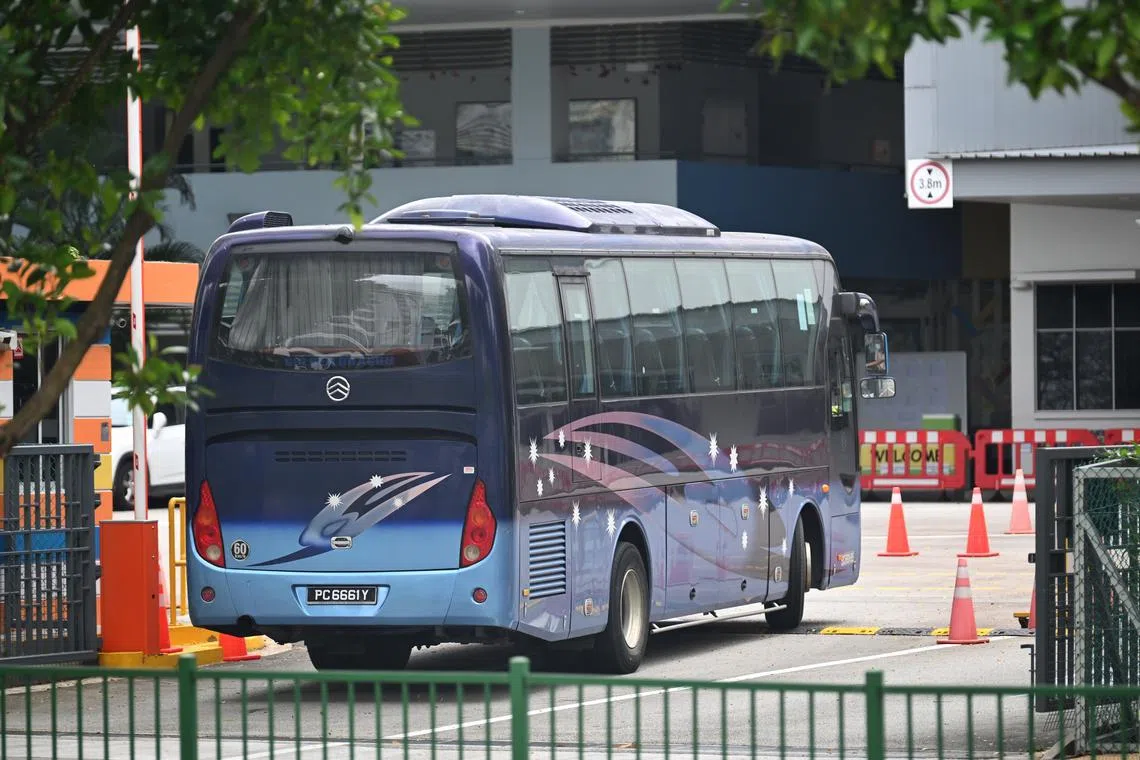6 school bus operators get green light to hire more foreign workers
Sign up now: Get ST's newsletters delivered to your inbox

Other measures to tackle the manpower crunch include having common pick-up and drop-off points to shorten journey times.
ST PHOTO: CHONG JUN LIANG
SINGAPORE - Six school bus operators have been allowed to hire more foreign drivers for two years, after the Ministry of Education (MOE) announced in June that operators could apply for higher foreign worker quotas
Applications were assessed based on the extent of the operator’s participation in serving the schools, as well as its commitment to recruiting local drivers, MOE said in response to queries.
Bus operators need to have at least two MOE school contracts and provide supporting documents of their hiring initiatives for Singaporean and permanent resident drivers.
Eligible operators may continue to apply for additional foreign worker quotas if needed, said MOE. The ministry declined to disclose the names of the six operators that received higher quotas.
Besides allowing selected operators to hire more foreign drivers, other measures by MOE to tackle the manpower crunch include having common pick-up and drop-off points to shorten journey times.
Singapore School Transport Association (SSTA) spokesman Darry Lim said only mid-sized companies with fleets of 10 to 15 vehicles each would meet MOE’s criteria, and questioned their feasibility.
He noted that less than 10 per cent of SSTA’s members will benefit from the additional quota, as most of them hold only one MOE school contract and will not risk incurring additional costs – buying new buses and hiring more locals – to meet the qualifying requirements.
Mr Lim added: “Imagine if you are (a bus operator who is) already in your 60s. Are you going to risk half a million just for a temporary solution?”
He said the measure does not address underlying causes of the manpower crunch, which include ageing drivers being forced to retire and others calling it quits due to factors such as low wages, high certificate of entitlement renewal rates, rising diesel prices and costly vehicle electrification plans.
He suggested revising the foreign worker quota for the school bus sector, to allow operators with fewer local employees to recruit foreign drivers.
Mr Lim added that the ministry is, in effect, inviting operators to bid for more school bus contracts in order to qualify for higher foreign worker quotas.
This is “very risky”, as operators that are unable to cope with the larger scale of operations might be forced to terminate contracts early, like what happened at St Stephen’s School, he said.
Mr Phillip Peh, president of the Singapore School and Private Hire Bus Owners’ Association, also said MOE’s qualifying criteria will encourage some existing operators to bid for more school bus contracts.
Mr Peh, who is chairman of Tong Tar Transport, plans to use the new foreign hires to replace drivers who are nearing retirement if the ministry approves his application.
In MOE’s foreign worker quota application form seen by The Straits Times, bus operators need to share how they will be deploying the new drivers in their operations and if they have plans to serve more MOE schools.
Operators are also required to provide their adjustment plans following the expiry of the additional foreign worker quota after two years.
Editor’s note: This story has been updated to correct a quote from Mr Peh for accuracy.


